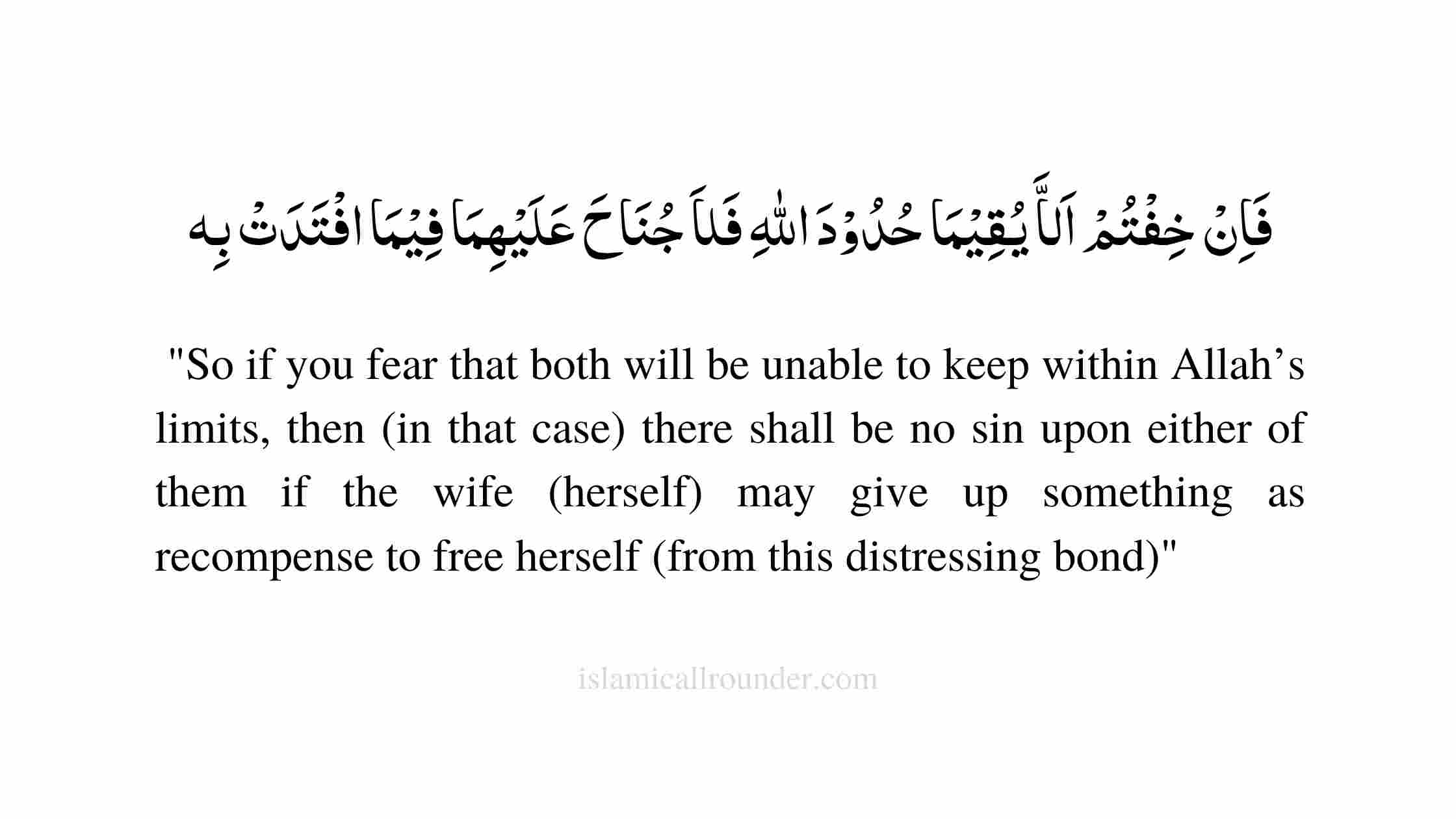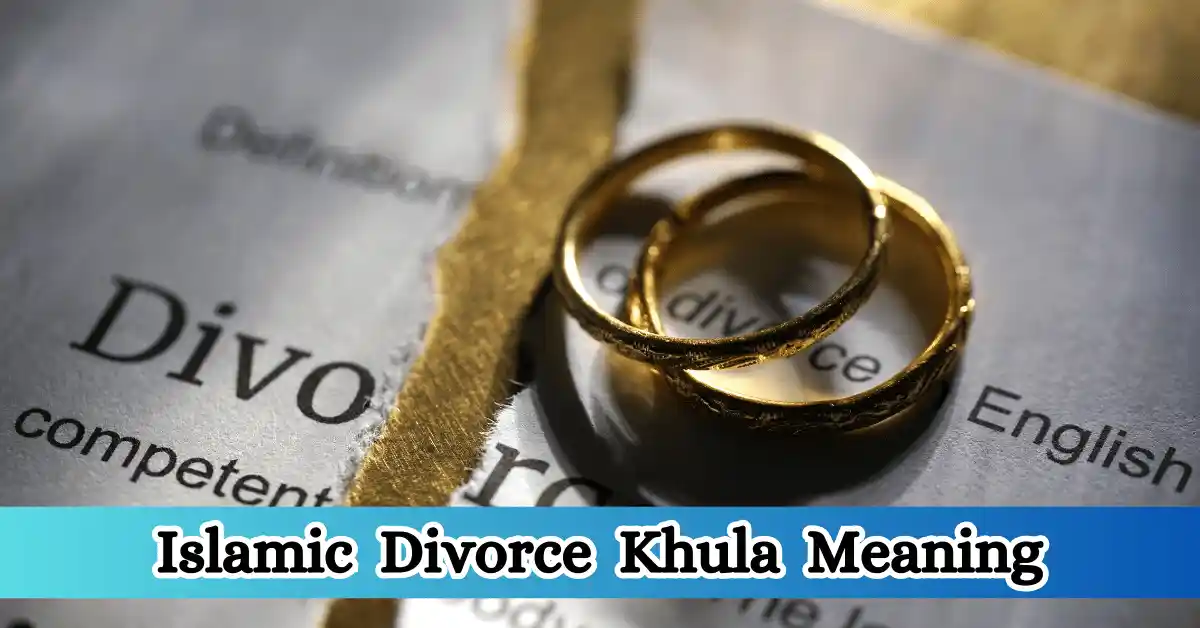Islamic Divorce Khula, holds a significant place in Muslim law. Khula is a process by which a woman can initiate a divorce, seeking release from the marriage contract. This article delves into the meaning of Khula in Muslim law, providing a comprehensive understanding of its implications and procedures.
In the family system of Islam, the knot of marriage is in the hands of the husband. If, after marriage, the wife does not want to live with the husband for any reason, she agrees to divorce him by giving some property to the husband through court; this matter is called Khula.
If the husband does not agree to the Divorce and does not fulfil the rights of the wife, then the court cancels their marriage. This case is called annulment of marriage.
What is Khula in Islamic Law?
Khula is an Arabic term meaning “to remove” or “to take off.” In the context of Islamic law, it refers to a woman’s right to seek a divorce from her husband. Unlike Talaq, which the husband initiates, Khula is initiated by the wife. This process allows a woman to obtain a separation from her spouse if the marriage is no longer tenable.
Key Elements of Khula
- Initiation by the Wife: The process begins when the wife expresses her desire for divorce.
- Compensation: The wife may be required to return her Mahr (dower) or any other financial settlement agreed upon.
- Judicial Oversight: A Qadi (Islamic judge) or a court may oversee the proceedings to ensure fairness.
Historical Context of Khula
The concept of Khula finds its roots in early Islamic history. It is mentioned in the Hadith and has been practised since the time of the Prophet Muhammad (PBUH). This right granted to women was revolutionary for its time, offering them an avenue for autonomy and freedom from oppressive marital situations.
The Process of Khula
Initiating Khula
- Request: The wife must formally request a divorce from her husband.
- Agreement: If the husband agrees, the couple can mutually dissolve the marriage.
- Judicial Intervention: If the husband does not agree, the wife can approach an Islamic court.
Role of the Islamic Court
- Mediation: The court may first attempt to reconcile the couple.
- Hearing: If reconciliation fails, the court will conduct hearings to evaluate the legitimacy of the request.
- Decision: Based on the evidence and testimonies, the court can grant the divorce.
Grounds for Khula
Several grounds may justify a woman’s request for Khula, including:
- Abuse: Physical, emotional, or psychological abuse by the husband.
- Neglect: Failure of the husband to fulfil his marital obligations.
- Irreconcilable Differences: Incompatibility and inability to continue the marriage relationship.
Legal and Cultural Perspectives
Legal Framework
Khula is recognized under Sharia law and is practised in various forms across Muslim-majority countries. The specifics of the process may vary depending on local customs and legal interpretations.
Cultural Sensitivity
Cultural attitudes towards Khula can differ. In some societies, women may face social stigma or pressure when seeking a Khula. It is crucial to understand these cultural nuances to provide adequate support and information to those in need.
Comparing Khula with Talaq
Talaq (Divorce by Husband)
- Initiated by the husband.
- Does not require judicial intervention.
- It can be pronounced verbally or in writing.
Khula (Divorce by Wife)
- Initiated by the wife.
- Often requires judicial oversight.
- This may involve returning the Mahr or other financial agreements.
Importance of Khula in Modern Times
In contemporary society, Khula remains a vital mechanism for women’s rights and empowerment within the framework of Islamic law. It provides a balanced approach to marital dissolution, ensuring that both parties have the opportunity to seek a resolution.
Hazrat Thabit bin Qais Khula case
The case of Hazrat Thabit bin Qais (RA) and his wife was presented to the Prophet (PBUH). The wife of Hazrat Thabit (RA) had no complaint against them, but she did not like them. Hazrat Muhammad (PBUH) separated them.
The wife of Thabit bin Qais offered to serve the Hazrat Muhammad (PBUH). I do not object to or blame the religion or morals of Thabit bin Qais; I do not like my husband. Hazrat Muhammad (PBUH) said, Will you return to him the garden which you have taken as a dowry she said: yes; Hazrat Muhammad (PBUH) said: Accept your garden and give it a divorce.
An example of unilateral abrogation is found in the hadith that Hazrat Khansa bint Khuzam Ansariyyah said: Her father married her somewhere. At the same time, she was a widow, but he did not like the marriage. So she came to the service of Hazrat Muhammad (PBUH), and Hazrat Muhammad (PBUH) annulled her marriage.
The narration of Hazrat Thabit bin Qais is an example of Khula, while the narration of Hazrat Khansa bint Khidham Ansariyyah is an example of annulment of marriage. Even when the court separates, one of these two cases occurs.
Islamic Divorce khula Meaning in Quran
If, for some reason, hatred arises in the heart of the wife and she does not want to live with her husband, she can exercise the right of Khula.

If the husband divorces, the wife is forbidden to take back the property, but when there is no harm on the part of the husband, but the wife does not want to live with him for any reason, she can demand Khula and Divorce. In that case, the man can take back the amount of Haq-e-Mahr, etc., as stated in the above verse.
If the couple is not living together and the hatred has increased to such an extent that they can’t live together, then they should separate in order to establish the limits of Allah Almighty. This separation can happen in two ways:
One is that the husband should divorce, and the other is that the wife should take the matter to court. If the matter comes to court, the priority of the judge should be reconciliation between the spouses.
If there is no reconciliation, the judge should persuade the husband to divorce voluntarily. If the husband is not ready for it, then the wife should make some transactions and convince the husband to Divorce (this is also called Khula).
If none of these methods work, the wife gives acceptable reasons according to Shari’ah, such as the husband abuses her, tortures her physically and mentally, does not pay her dues, and does not divorce her. , Does not pay bread and maintenance, the husband is suffering from a contagious disease, the woman has been deceived at the time of marriage, etc., then the court will annul the marriage.
Khula Before Rukhsati
If there is no leave rukhsati after marriage, then the man is obliged to pay half of the dowry, and the woman will return the dowry in the case of Khula. Or she will not take the dowry at the time of Khula.
If the husband is divorcing himself, he should, in any case, give one, only one, just one Divorce. Don’t even think of giving two or three; don’t even think of providing two or three divorces. After Divorce or Khula, the wife will spend the days of ‘iddah, and after that, she can get married wherever she wants.
Frequently Asked Questions
What is the difference between Khula and Talaq?
- Khula: Initiated by the wife, often involves returning the Mahr.
- Talaq: Initiated by the husband, typically requires no return of the Mahr.
Can a woman seek Khula without her husband’s consent?
- Yes, a woman can seek Khula through an Islamic court if her husband does not consent.
What happens if the husband refuses to grant Khula?
- The wife can approach an Islamic court to request a judicial divorce if the husband refuses.
Is Khula recognized in all Muslim countries?
- Khula is recognized in most Muslim-majority countries, though the procedures and acceptance may vary.
Does Khula require a financial settlement?
- Often, the wife may need to return her Mahr or agree to a financial settlement as part of the Khula process.
Conclusion
Understanding the concept of Khula and its significance in Muslim law is essential for recognizing the rights and freedoms granted to women within Islam. As societal norms evolve, the practice of Khula continues to serve as an important legal remedy, empowering women to seek divorce and reclaim their lives when necessary. By shedding light on this topic, we aim to provide valuable information and support to those navigating the complexities of Islamic divorce.
